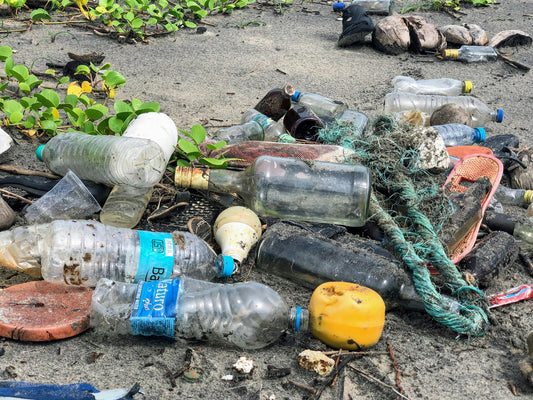Share
As we become more environmentally aware, we look for sustainable materials to replace plastic. One key contester in this discussion is aluminum.
Aluminum has a rich history, dating back centuries and is used in various industries. The material is gaining more and more traction as a sustainable alternative.
The decision between aluminum and plastic is not always straight forward though.
Both materials have their own set of advantages and drawbacks. It is essential to consider various factors before making a choice
In this article, we'll explore the characteristics of both materials.
Finally, we'll answer the question: Is aluminum better than plastic?
The Rise of Aluminum
Aluminum's journey began with its discovery in the 19th century, following advancements in chemistry and electricity.
The metal quickly transitioned from being a precious metal to a widely used material.
It got adapted in various industries, including aviation, shipbuilding, automotive, and civil engineering.
The discovery of the "Hall-Héroult" process in 1886 revolutionized aluminum production further. The so-called smelting process marked the transition from precious metal to industrial commodity.
This transition also set a new stage in the evolution of aluminum prices. With easier production and increasing supply, aluminum gained broad acceptance.
One of the first success stories was the construction of the iconic Empire State Building in 1931. Aluminum played a significant role during the build, which caused its widespread use in construction.

In 1959, Coors conducted research about a beverage container that "[...] consumers could one, recycle, and two, would still keep the beer in good flavor for longer periods of time,"
The famous beer can was born.
From these two examples alone, you can see that aluminum is an incredibly versatile material. But let's dive into the reasons for Aluminum's success one by one.
1. Versatility

Aluminum is easy to process and is robust in different shapes and sizes.
That makes aluminum incredibly adaptable to any use imaginable. From packaging to construction.
If you walk through daily life, you'll find aluminum in many products, from tiny wires and electronic components to massive builds like escalators, and of course various food packaging.
2. Durability
Aluminum products are known for their durability. They withstand harsh conditions and external influences like weather or corrosion.
That's why many kitchen appliances and outdoor products use aluminum.
It is also resistant to fire and impact.
3. Low Weight
Aluminum is a very lightweight material.
The average 500ml aluminum can weighs around 15 grams, compared to 19 grams for plastic and 300 grams for a glass bottle.
This low weight, paired with stability and weather resistance is a huge advantage for transport and storage.
4. Recyclability

Littered aluminum takes 250 years to decompose. So why is it still a sustainable material?
The main reason: it is the most recycled material in existence.
The advantage of aluminum against other materials like plastic is that aluminum is infinitely recyclable without losing quality.
In fact, estimates show that 75% of aluminum ever made is still in use today.
While recycling should be the last resort after reducing waste and reusing what you can, aluminum is a promising contestant to enable a truly circular economy.
Compared to plastic and even glass, aluminum is easier to sort, and does not lose quality if it's recycled.
Another great effect of recycling aluminum is that it saves 90% of the energy needed to produce new aluminum.
That resolves the high carbon impact as one of the biggest downsides of aluminum.
It is estimated that an aluminum can produces around twice the carbon as a plastic bottle.
While this is still an issue, recycled aluminum and clean energy used in production can significantly cut that concern.
5. Food Safety

Aluminum is very popular in the kitchen, because it is lightweight, conducts heat well, and is comparably cheap to produce and buy.
That also means our food is exposed to aluminum and there is a risk that small amounts of aluminum are ingested.
In fact, it is estimated that we ingest around 10 milligrams of aluminum daily from food.
The good news: the World Health Organization estimates that it is safe to consume up to 50 milligrams of aluminum without concern. It will just leave your rear end how it came in at the front.
While some studies tried to link high amounts of aluminum to Alzheimer's disease, luckily that link never got proven.
Aluminum vs Plastic: The Showdown

Conclusion
The battle between aluminum and plastic is a close one. We saw that there are many good reasons for the success of aluminum, and it has its place in the fight for a greener planet.
While aluminum has a higher initial carbon impact, it promises to be an important material for a circular economy, because of its great recyclability.
Replacing some of our plastic products with aluminum can be a sustainable and healthy choice.
But as always, we should remember to pair this with conscious consumption and reusing what we have already.
We hope you enjoyed this article. If you want to read more like this, make sure to check out our Blog and follow us on Instagram. If you are interested in truly sustainable products, check out our Shop.









2 comments
Hi D,
thanks for your comment.
You are raising a good point, and we may consider adding some information about the health aspect in the article.
Unfortunately, most aluminum cans are lined with a small layer of plastic to prevent oxidation of the aluminum.
From a health aspect, there should not be a big difference between the two.
We will do some research to add a few more details in the article.
If you want to be on the safe side, glass containers have been found to be generally non-toxic and safe for food and beverages.
Make sure to subscribe to our email list to stay posted :-)
Cheers,
Lars
Great but high acidic juices like tomato, V8, etc. ate these better in plastic or aluminum? Only asking about health aspect